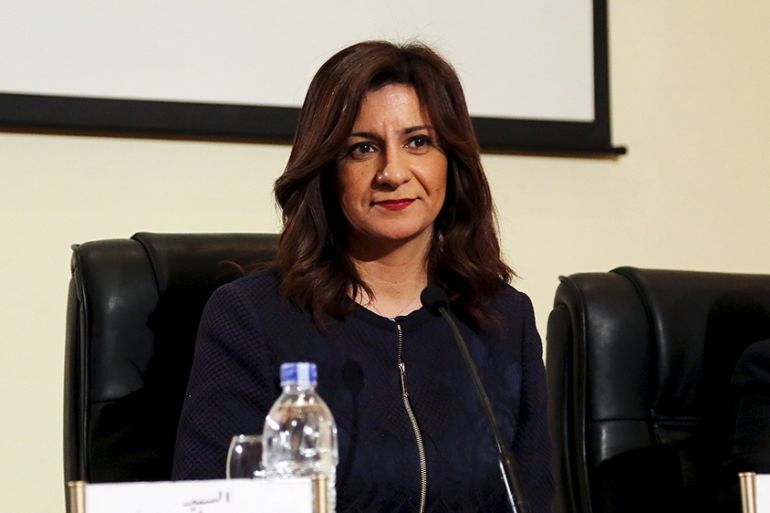Egypt minister’s alleged threat to critics sparks outrage
Nabila Makram makes a throat-slitting gesture while speaking about expatriate Egyptians criticising the country.

Egyptians have taken to social media to denounce a speech made by the country’s immigration minister, in which she appears to suggest that people who criticise the country should be killed.
“Anyone who says anything about our country, what happens to them?” Nabila Makram asked during a private party on Tuesday for Egyptian diaspora members in the Canadian city of Toronto.
“We cut,” she said, raising her hand to her throat in a move that triggered laughter in the room, but also raised concerns that she was condoning violence.
Her words were condemned by journalists and activists who said such comments contribute to the climate of fear entrenched in the Egyptian society regarding freedom of expression.
Mohamed Kamel, a member of the board of directors of the Egyptian Canadian Coalition for Democracy, told Radio-Canada on Tuesday that the remarks were “very dangerous and unacceptable”.
“It reminds us of the Jamal Khashoggi case,” he said, referring to the dissident Saudi journalist who was murdered and dismembered last year at the kingdom’s consulate in Istanbul.
نبيلة مكرم عبيد تهدد المعارضين بالذبح: "أي حد يقول كلمة بره على بلدنا يحصله إيه؟.. يتقطع"..
مصر قررت تستخدم الطريقة السعودية في التعامل مع المعارضين، محدش يروح سفارات مصر لوحده يا جماعة.#moh_rabei
— المسحراتي (@almesahraty) July 24, 2019
Translation: Egypt has decided to follow the Saudi way to deal with dissidents. No one should go to the Egyptian embassies alone.
Amr Magdi, a researcher for the Human Rights Watch, said Makram’s comment is “no joke”.
“This minister’s sinister words are a testament to the Egyptian government’s alarming record of disappearing, imprisoning, and executing dissidents,” he said on Twitter.
نبيلة مكرم مثل حي و دليل علي دونية و بلطجة و خرف الأنظمة المتسلطة و المستبدة
— Yasser Fouad (@dryasserfouad1) July 24, 2019
Translation: Nabila Makram is a live example of the inferiority, bullying, and autocracy that characterise regimes.
Egyptian writer Sawsan Gharib warned that if any harm was done to the opposition members, the government of Abdel Fattah el-Sisi would be responsible.
“If any member of the Egyptian opposition outside the country gets hurt in any way, it will be as a result of the Sisi regime’s incitement,” she said on Twitter.
Jamal Sultan, editor-in-chief of independent daily al-Mesryoon, called for Makram’s dismissal and an investigation into the matter.
“Any delay means the official involvement of the Egyptian government in the crime of incitement to terrorism and extrajudicial killings,” he said.
Crackdown on dissent
Makram’s comments came during a speech in which she said, “Egypt embraces all of us and brings us closer together. Wherever we go, it stays in our hearts and we can’t tolerate anything said about it outside.”
Her ministry’s Twitter account on Tuesday quoted her as being surprised by the “misinterpretation” of her statements, saying she had no violent intent.
The ministry said, “I cut his throat” is a “common expression” in the Egyptian dialect, which signifies when “someone is very angry”.
“The state is protecting its children and not threatening them,” Makram said via her ministry, and is facing “a fierce war and groups that are seeking to divide and minimize achievements and successes”.
However, Magdi regarded Makram’s clarification as being intolerant of criticism.
“This is exactly what thuggish governments are about: punishing criticism and equating it with criminal activity,” he said.
Egypt’s President el-Sisi has faced international condemnation for a crackdown on civil society groups since he took power in 2014, a year after the military toppled former president Mohamed Morsi.
Rights groups have accused his government of human rights violations and repression of dissidents.
In January, Amnesty International said Egyptians are facing an unprecedented attack on their freedom of expression.
“Today, it is more dangerous to openly criticise the government in Egypt than at any other time in the country’s recent history,” said Najia Bounaim, Amnesty’s North Africa campaigns director.
“Those living under President Abdel Fattah el-Sisi have experienced an unprecedented assault that has seen those who peacefully express their views treated as criminals,” Bounaim said.